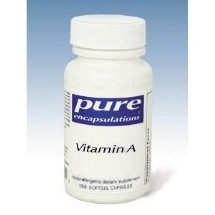
The Overlooked Vitamin
When we think of vitamins, vitamin c, e, and d, come to mind immediately, but we don’t really think about vitamin A, what it does, and why it’s important. For that reason some of the information on this page may surprise you.
Vitamin A is a fat soluble compound related to beta-carotene, and both retinal and retinol. It is sometimes confused with beta-carotene which is described as “pro-vitamin A” because your body can convert into vitamin A when necessary.
Both beta carotene and vitamin A are needed for the health of your immune system, bones, skin, and eyes. Below are some of the benefits of vitamin A:
- Helps prevent both osteoarthritis and osteoporosis
- Provides powerful antioxidant protection
- Can be used in the treatment of cardiovascular disease
- Vitamin A supplementation can reduce infant mortality
- Lowers homocystiene
- Improves healing of wounds
- May decrease the risk of breast and prostate cancer
- Helps to prevent cataracts
- Reduces risk of liver disease cancer of the liver
- Can shrink tumors and metastasis
- Can prevent “night blindness”
Recommended dosages for vitamin A are somewhat more conservative due to the fact that being fat soluble it can build up in tissues and cause potential toxicity. This is a problem with the synthetic form of vitamin A supplements. The natural forms of this vitamin have a much higher threshold for vitamin A toxicity symptoms.
The RDA for adults is 5,000 IU (international units) with the upper limit of recommended intake at no more than 10,000 IU.
The upper recommended limit for children is 3,500 IU per day.
To get the benefits of vitamin A you should also get enough beta carotene. Some experts suggest that up to 50% of your daily intake of vitamin A should be in the form of beta-carotene.
Vitamin A Deficiency Symptoms
Here is a short list of possible vitamin A deficiency symptoms:
- Premature birth
- Cleft palate
- Eye problems in newborns
- Congenital birth defects
- Kidney disease, kidney stones and infections
- Tuberculosis
- Macular degeneration
- Type II diabetes
- Coronary artery disease
- Rheumatoid arthritis
- HIV Aids
While none of these conditions in and of themselves prove you have a vitamin A deficiency, they possibly indicate that you should take note of your intake and if necessary add a supplement to prevent deficiency, especially if you are not consuming vitamin A foods.
Vitamin A Foods
Aside from a few vitamins that are hard to obtain from your diet, the best way to get nutrients is in the foods you eat. The following vitamin A foods are natural sources that will help supply your daily needs.
- Carrots (best course of beta-carotene)
- Cod liver and cod liver oil
- Chicken and beef liver
- Butter
- Broccoli
- Collard Greens, Kale, Spinach
- Pumpkin, sweet potato
- Egg yolks
- Mangoes, apricots
If you can’t bring yourself to include enough of these vitamin A foods in your diet, then you should consider supplementation to get the full benefits of vitamin A. There are a number of quality brands on the market, but I would recommend either Metagenics, or Pure Encapsulations.
Remember that when it comes to supplements you generally get what you pay for. Oil soluble vitamin supplements should always be sold in dark bottles, and kept in a cool place. If you see them stored in transparent bottles and a warm environment do not buy them.
Vitamin A Toxicity Symptoms
As I mentioned earlier the threshold for vitamin A toxicity symptoms is pretty high with natural sourced supplements and also with foods. Synthetic vitamins can cause problems with toxicity, so avoid them and spend a little extra for the real thing.
That said here are some signs of toxicity:
- Vomiting
- Headaches
- Joint pains
- Hair loss
- Irritated skin
- Stomach distress
Avoid the synthetic form of vitamin A and beta carotene. If you supplement stick with high quality brands and you should be fine.
The benefits of vitamin A will be optimized of you eat some vitamin A foods and use a good quality supplement just to be sure you are getting enough.
The Benefits of MSM for Antiaging






